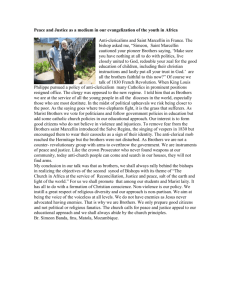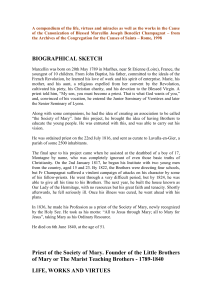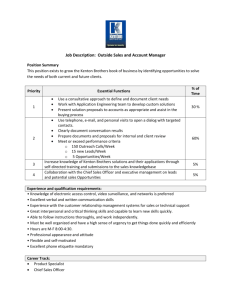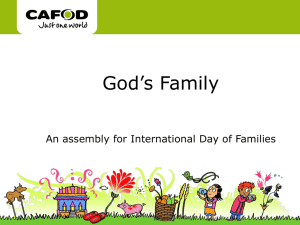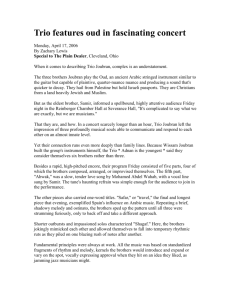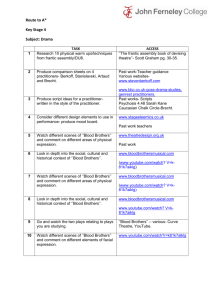St Marcellin Champagnat Founder of the Marist Brothers 1789 1840
advertisement
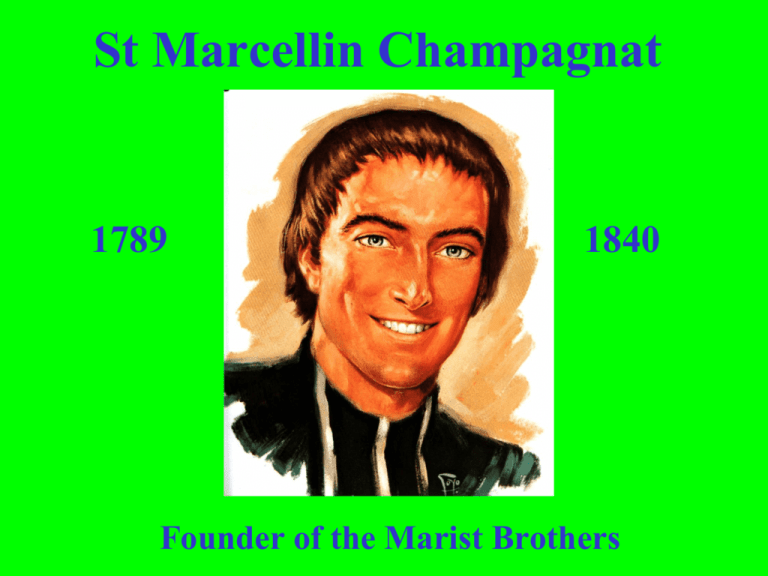
St Marcellin Champagnat 1789 1840 Founder of the Marist Brothers 1789 • In 1789, France was rocked by the Revolution. In that same year, a child was born who was to start another kind of revolution. He was the son of Jean Baptiste Champagnat, a farmer who lived in a little village in the south of France, and his wife, Marie Chirat. The boy was the ninth of their ten children. Baptism • The day after he was born, he was brought to the little parish church in Marlhes, a couple of miles from their home, and there baptized with the names Joseph Benedict Marcellin. The last name was the one by which he was to be known throughout his life. Home Life A great influence in his life was his aunt Louise, who was a nun, but had been forced to leave her convent when it was burned down by the revolutionaries, and had come to live with the Champagnat family Marcellin’s father • Marcellin’s father was in favour of the ideals of the Revolution, but not of the way they were put into practice. He became Commander of the local National Guard, and used his position to save many priests from capture and death. What will I be? • Like his brothers and sisters, Marcellin grew up looking after his father’s flocks and helping on the farm. The skills he learned at this time were to stand him in good stead in later life. Schooldays • His father sent him to school, but the schoolmaster was a very badtempered man, who struck the children on the least excuse. Marcellin refused to go back to school, and later, laid down strict rules for his Brothers about punishment. The Call • When he was 16, a priest came looking for boys to join the priesthood, and Marcellin decided to follow his call. His schooling had not been the best, but he got down to his studies, although with great difficulty. However, he worked hard, and succeeded. Leaving Home • He finally reached the standard for entrance to the Junior Seminary, sold off his lambs to help with the expenses of new clothes, etc, and left home. Though he did not know it, both his father and his mother were to die before he became a priest. Happy Gang • Marcellin and a few friends made a name for themselves as the “Happy Gang”, who were always getting into trouble. However, the death of his best friend and then of his mother mad him more serious, and he began to work in earnest. Studies • He eventually became a prefect in the school, and had a room of his own. He took advantage of this to work at his studies during the night, and succeeded in reaching the required standard. Ordination • Finally the great day came, and he was ordained priest on July 2nd, 1816. The next day, with another seven new priest and four deacons, he went to the church of Our Lady of Fourvières, where they promised to work towards founding a Society of Mary. New Curate • He was appointed as curate to a little mountain parish called Lavalla, where he soon became well-liked by everyone. The parish priest was old and ill, and most of the work fell to Marcellin. He said later, “Every road here was drenched with my sweat!” The Montagne Boy • He had always insisted on the need for Brothers to teach the children. Now he was called to a dying boy, and found he had never even heard of God! This decided him. We would found a group of Brothers to work in schools in the country areas. The First Brothers • He spoke to Jean Marie Granjon, who had gone with him to see the Montagne boy, ans asked him if he would like to become a Brother. The young man agreed, and was joined by another, Jean Baptiste Audras. So, on January 2nd, 1817, the Marist Brothers began! Nailmaking • Schools were closed for a long time in summer, so to keep his young men occupied and to help with the expenses of the house, Marcellin taught them to make nails, which they sold to the local craftsmen. Notre Dame de l’Hermitage • By 1824, the numbers were too big for the house in Lavalla and Marcellin bought a property further down the valley, where he built Notre Dame de l’Hermitage, which is still in constant use, and where he is buried. Memorare in the Snow • One day he had been on a sick call with one of the Brothers, and they were caught in a snowstorm. Things got worse, and Marcellin prayed to Our Lady to help them. Just then they saw a light come out from a house, and went towards it. They were saved! With his Brothers • By now Marcellin had about 50 Brothers, and the Archbishop gave him permission to stop his parish work to be with his Brothers. He was now able to visit all the schools where they taught and to encourage them in their work Schools • Requests were coming in for Brothers to teach in many of the small towns and villages in the area, and he tried to grant them all. He insisted that there should always be at least three Brothers in a school, and he spent most of his time going round to make sure that all was well. Hail, Holy Queen • In 1830, France had another revolution and some of the Brothers wanted to go into hiding. But Marcellin told the Brothers that Our Lady would protect them, and to ask her help, he began the practice of starting and ending each day with the Hail, Holy Queen, a practice still carried on. Death • Marcellin’s health was now giving way to the pressure of his work, and in 1840 he told the Brothers to elect a new Superior. On May 3rd he said his last Mass, and a month later, on June 6th, as the Brothers were singing the Hail, Holy Queen at their Morning Prayer, he went to his reward. Canonization • Marcellin’s life was ended but his work was not, and his Brothers spread all over the world. • On 29th May 1955, Pius XII beatified him, and finally on 18th April 1999, John Paul II proclaomed him • Saint Marcellin, Founder of the Marist Brothers Marist Brothers Mary – Marist – Mission encircling the globe
